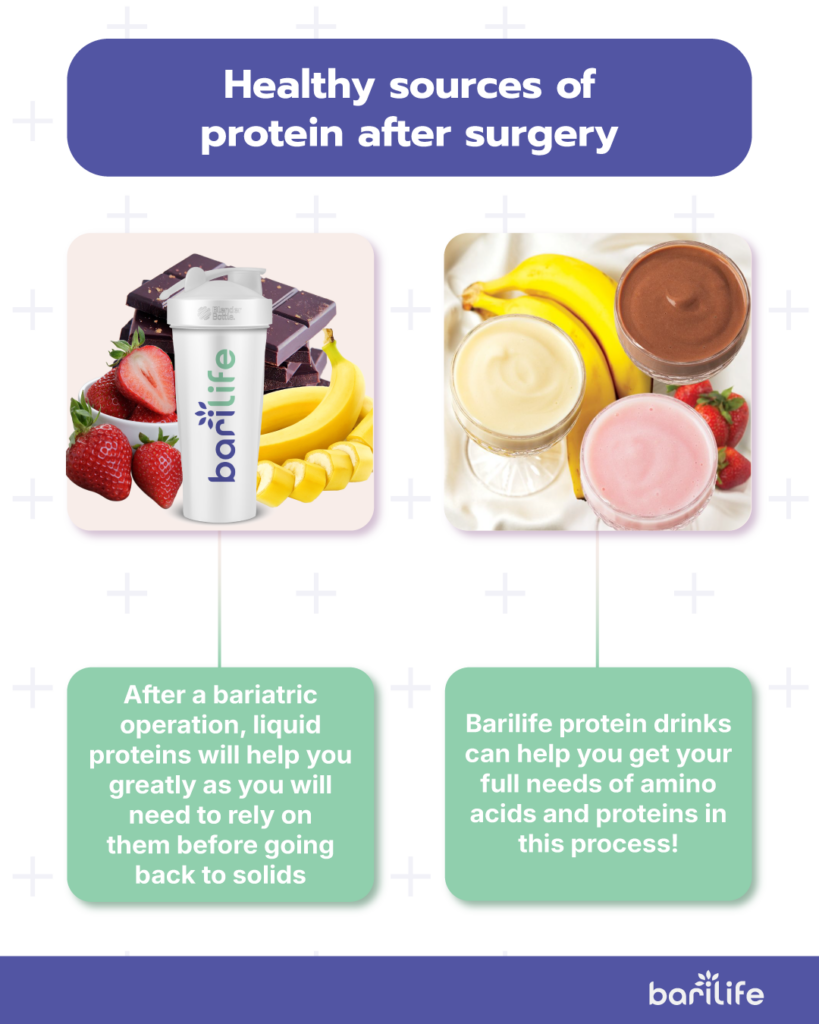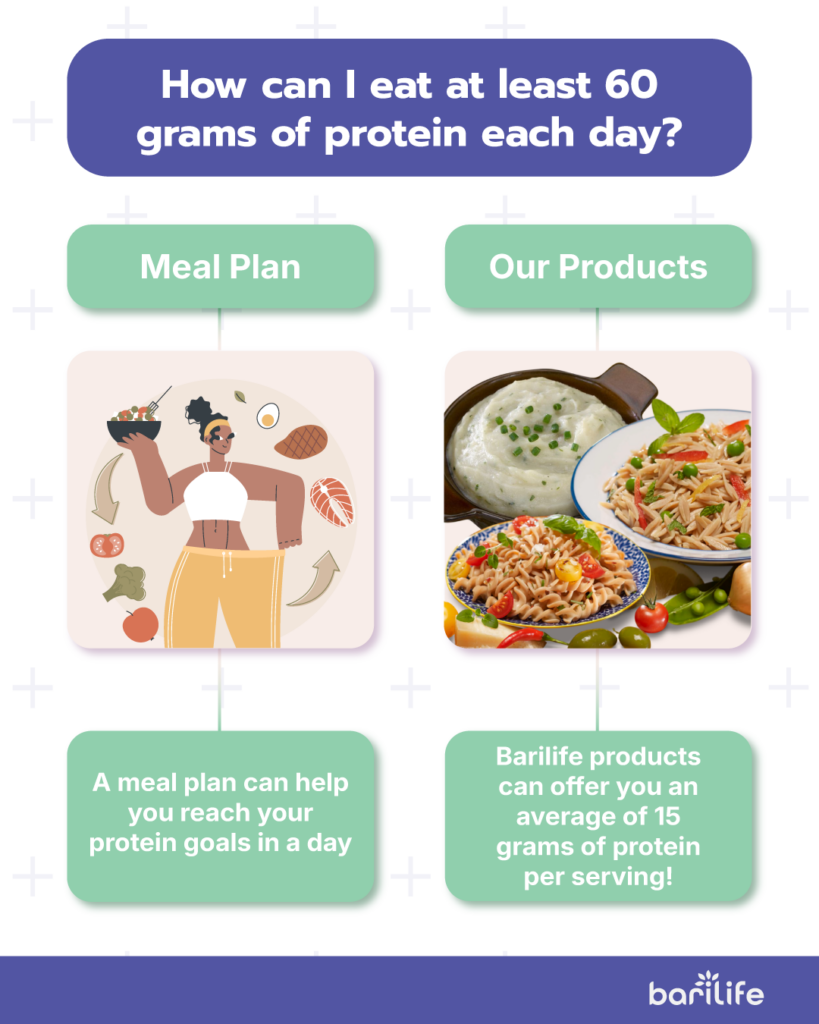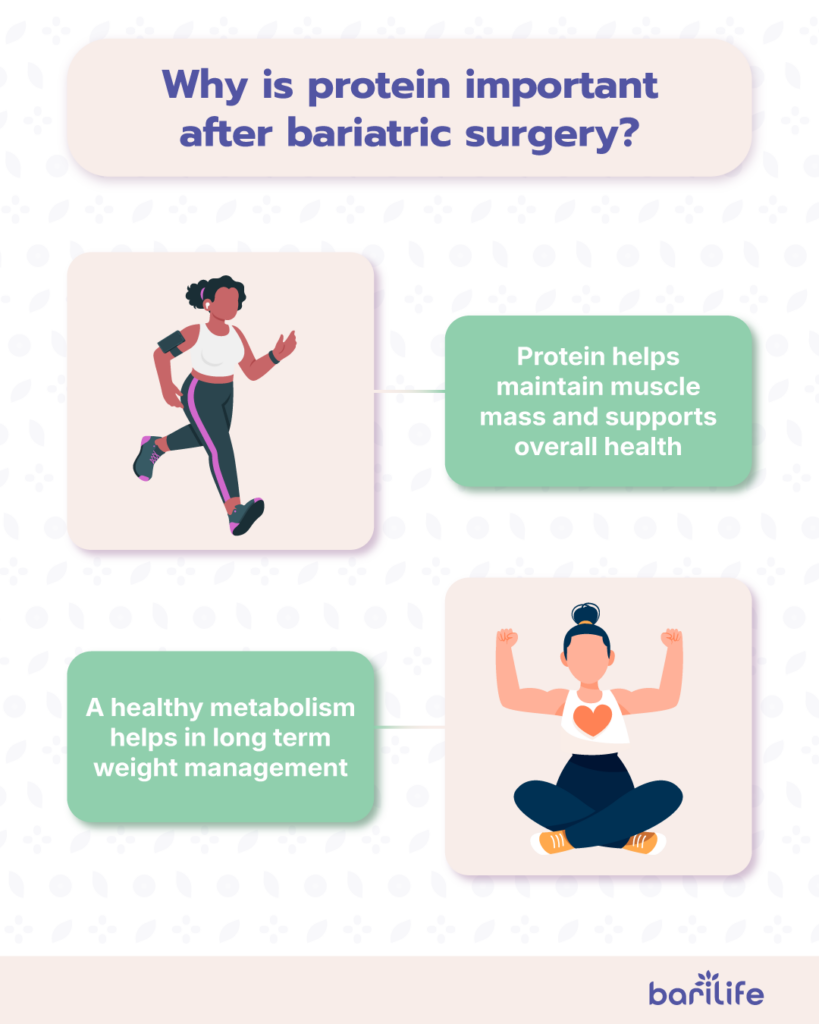Key Takeaways
- Prioritizing protein intake after bariatric surgery is essential for healing and maintaining your muscles during rapid weight loss.
- While there are specific recommendations for protein intake, your healthcare team will provide personalized recommendations.
- Choose a variety of protein sources, such as bariatric protein shakes, bariatric protein bars, lean meats, eggs, dairy, beans, and tofu.
Table of Contents
After bariatric surgery, most surgeons recommend consuming between 60-80 grams of protein daily, although this number may be higher for men.
Your protein needs after surgery are significantly higher than before surgery. This is because your body depends on protein for the building blocks to heal and to maintain your lean muscle.
Incorporating specialty bariatric vitamins and bariatric multivitamins can further support your recovery and overall health.
What happens if you don’t get enough protein after bariatric surgery? You may experience muscle loss, slow healing, and even a slower metabolism, making protein crucial for recovery.
Read on to learn why is protein important after bariatric surgery, how much protein you’ll need, and some highly recommended protein sources.
Why is protein important after bariatric surgery?
Protein provides your body with the building blocks for tissue repair and wound healing. Protein also supports your immune system and reduces the risk of complications after surgery.
Protein is also essential for preserving your muscle mass, which can decrease during rapid weight loss.
Keeping your muscle mass is not only important for maintaining your strength, but it also supports healthy metabolism and long-term weight management.

How much protein do I need after bariatric surgery?
While the general recommendation for protein intake after bariatric surgery is 60-80 grams per day, the ideal amount can vary.
Factors such as your weight, type of surgery, overall health, and gender can play a role in determining the specific amount of protein you need.
Your bariatric healthcare team will provide you with personalized guidance on your protein goals.
Right after surgery, your protein intake goals may be slightly lower and gradually increase as you transition from liquids to solid foods.
Do I really need to worry about how much protein I eat after bariatric surgery?
Yes! Prioritizing protein intake after bariatric surgery is crucial.
Not getting enough protein puts you at risk of slow healing, losing muscle, and slower metabolism.
Protein also helps you feel full after eating smaller portions and supports your long-term weight management goals.
Eating enough protein also helps prevent malnutrition and nutritional deficiencies that can sometimes result after bariatric surgery.
Healthy sources of protein after surgery
In the early stages of recovering from surgery, you’ll rely on liquid protein sources until solid foods are gradually reintroduced.
Opt for protein shakes and supplements that are low in sugar and carbohydrates to avoid dumping syndrome, a common concern after bariatric surgery.
Whey protein isolate is often considered the gold standard after bariatric surgery due to its easy digestion and complete amino acid profile. It’s also free of lactose, which sometimes causes digestive discomfort.
Hydrolyzed protein is another great option, as it’s broken down to make it gentler on the stomach.
If you prefer a plant-based option or are sensitive to dairy, pea and soy proteins are good sources as they are easily digested and contain all your essential amino acids.

How can I eat at least 60 grams of protein each day?
Making sure you meet your daily protein target requires some planning. Here are several tips to help you meet your goals.
- Aim to have a good source of protein at each meal and snack.
- Start your protein intake slower on the days right after surgery and gradually increase it, following your healthcare team’s guidelines.
- Prioritize high-protein foods like protein shakes and when you can eat solids, lean meats, eggs, fish, dairy, and beans.
- Use a protein supplement like protein shakes or bars if you are having trouble meeting your intake with food alone.
Barilife has several highly recommended protein options designed to meet nutritional needs after bariatric surgery. Each choice is high in protein and low in sugar and carbohydrates.
- Chewy Protein Bars: Choose from seven flavors of these on the go snacks containing 12-15 grams of protein per serving.
- Instant Protein Drink Bottles: Simply add water or milk to these bottles containing pre-measured protein powder, shake, and drink for an instant 15 grams of protein.
- Protein Soups: Mix up a savory soup like chicken bullion, cream of broccoli, or cream of tomato soup for a delicious 15 grams of protein.
- Pudding Shakes: Mix these protein packets with milk or water for a creamy shake or fulfilling pudding of 15 grams of protein.
- Hot Chocolate: Mix up a steaming mug of hot chocolate or another flavor for a delightful treat containing 15 grams of protein.
- Crispy Protein Bars: Stash these crunchy protein bars in your car or gym bag for a quick snack of 15 grams of protein.
- Protein Cereal: Start your morning with 15 grams of protein in a crunchy bowl of cereal mixed with milk or yogurt.
- Protein Oatmeal: Swap out high-carbohydrate oatmeal for this low-carbohydrate and 15 grams of protein oatmeal that’s perfect for a quick breakfast.
- Protein Smoothie Packets: Blend up a refreshing smoothie, such as aloha mango, berry delicious, or strawberry banana, for 15 grams of protein.
- Protein Pancakes: You don’t have to miss out on pancakes with these delicious pancakes containing 15 grams of protein per serving.
- Protein Entrees: These hearty microwaveable meals will satisfy your taste buds and hunger with 13-15 grams of protein per serving.
- Protein Mashed Potatoes: Fulfill your mashed potatoes craving with this perfectly portioned option that provides 11 grams of protein.
- Protein Double Bites: These double bites help fulfill that need for crunchy food while providing 10 grams of protein.
- Protein Pasta: You can still indulge in creamy pasta with these protein pasta meals that contain 15 grams of protein per serving.
- Protein Mug Cakes: Don’t miss out on dessert with these decadent mug cakes that provide 12-15 grams of protein.

What happens when we eat too much protein?
While you need to prioritize protein, eating other foods is also important.
Focusing too heavily on protein can lead to not consuming other essential nutrients like fiber, vitamins, and minerals.
This imbalance may lead to nutritional deficiencies over time,which is why supplementing with bariatric vitamins and maintaining a balanced approach is crucial for your health.
Therefore, while maintaining an adequate protein intake, take a well-rounded approach that includes a variety of other nutritionally rich foods for optimal health.
Conclusion
Ultimately, prioritizing protein after bariatric surgery and choosing high-quality sources supports your long-term health goals.
Learning what your individual protein needs are and incorporating strategies to meet your daily goals helps your body heal and preserve your muscle mass.
It’s important to work closely with your bariatric healthcare team and follow their personalized protein recommendations.
If you want to learn more, why not check out these articles below:
- Best protein shakes for bariatric patients
- Best protein bars for bariatric patients
- Best protein powder for bariatric patients
Resources
Your Diet After Gastric Bypass Surgery. (2022). MedlinePlus.




What are your tips and tricks to post-bariatric success?